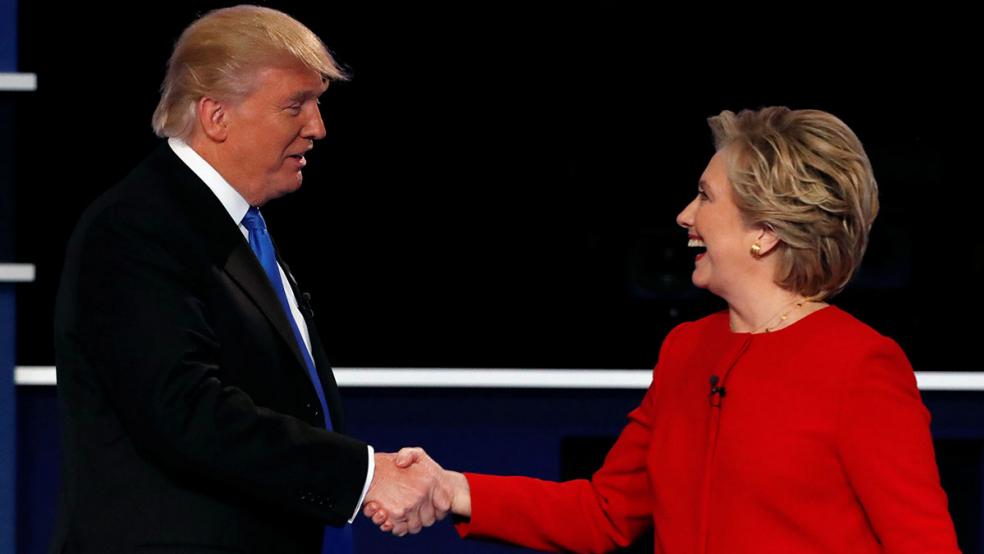A report on the “Benefits of Competition and Indicators of Market Power” from the White House Council of Economic Advisors documents that monopoly power has been increasing the last few decades, and it argues persuasively “that consumers and workers would benefit from additional policy actions by the government to promote competition within a variety of industries.” The report is part of an initiative by the Obama administration last spring to promote a “fair, efficient, and competitive marketplace” through stricter enforcement of antitrust regulations, and through other measures such as patent reform and the reform of occupational licensing.
To those who believe more aggressive enforcement of antitrust laws is needed, and I am one of them, Hillary Clinton’s recent announcement of “A new commitment to promote competition, address excessive concentration and the abuse of economic power, and strengthen antitrust laws and enforcement” is an encouraging sign that if Clinton is elected the Obama administration’s initiative will not end when he leaves office.
Related: The Mega-Danger of Mega-Deals: Monopolies Are Crushing U.S. Workers and Consumers
The presence of monopoly power harms the economy in several ways. In general, firms with market power charge higher prices than they would in a competitive market, they produce less output, and they use resources inefficiently. A high degree of market power tends to stifle innovation, reduce variety, and lower quality, which is harmful to economic growth. What incentive is there to improve when you don’t have competitors to worry about?
Market power also changes how income is divided up between profits and wages within firms, and there is evidence that this has contributed to inequality (which has its own negative economic effects). Last, but not least by any means, large dominant firms also tend to have considerable political influence that can be used to maintain and defend their market position.
Both Republicans and Democrats agree that the market system is the best way to organize an economy. There are some Democrats on the far left who would throw out the market system and replace it with something else; but for the most part, the left and the right endorse the market system. What they disagree about is how to respond when there are market failures such as excessive market power.
Related: Pentagon Worried About Defense Contractor Monopolies
Conservatives acknowledge that monopoly power has potentially negative effects, but they do not believe that government intervention is the answer except in the most extreme cases. Most of the time government makes things worse, and with patience, the market will eventually fix the problem all by itself (think of large, dominant firms in the past such as IBM that have lost market power over time). Even if the market doesn’t fix the problem, in most cases markets with dominant players are still better than markets where the government tries to make things better through regulation.
Democrats tend to see more harm from monopoly power than Republicans, they do not believe the market fixes these problems on its own (and if it does, it takes far too long for it to happen), and they also have more faith in the ability of government to bring about a more competitive marketplace. Thus, unlike conservatives who take a fairly passive stance toward monopoly power, Democrats advocate aggressive action by regulators when markets become overly concentrated.
The idea that markets will fix themselves when they fail or prevent failure is reminiscent of the claim from those who favor deregulation that market forces would ensure that large, systemically important financial firms will always have sufficient reserves on hand to prevent a widespread failure of financial markets. We know how that worked out. Despite the belief held by many on the political right that markets have a magical ability to overcome any and all market failures, and that government is always the problem, never the solution, there are times when laws and regulations are needed to make markets function better.
Related: Economic Models Must Account for ‘Who Has the Power’
Market concentration has been growing in recent decades. As The Economist reports, “The annual number of mergers and acquisitions is more than twice what it was in the 1990s. ... The share of GDP generated by America’s 100 biggest companies rose from about 33 percent in 1994 to 46 percent in 2013. The five largest banks account for 45 percent of banking assets, up from 25 percent in 2000.” Moreover, those figures do not capture the growing influence that these mega-firms have had in the political arena.
Donald Trump has promised to make deregulation one of the focal points of his presidency. If Trump is elected, the trend toward rising market concentration and all of the problems that come with it are likely to continue. We’ll hear the usual arguments about ineffective government and the magic of markets to justify ignoring the problem. If Clinton is elected, it’s unlikely that her administration would be active enough in antitrust enforcement for my taste. But at least she acknowledges that something needs to be done about this growing problem, and any movement toward more aggressive enforcement of antitrust regulation would be more than welcome.






